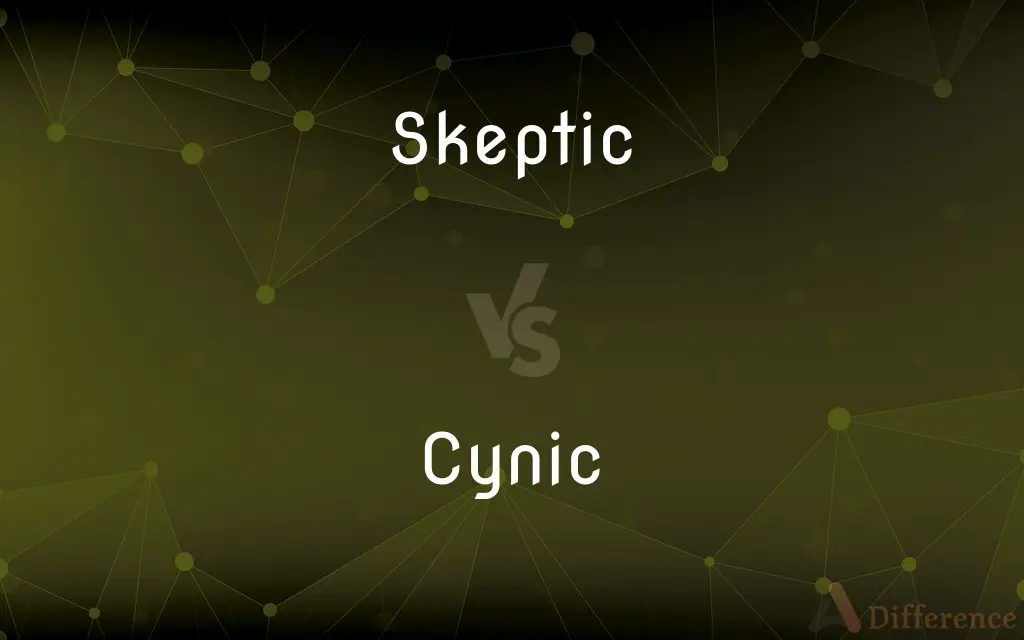Skeptic vs. Cynic — What's the Difference?
By Tayyaba Rehman — Published on October 31, 2023
A skeptic doubts or questions beliefs without conclusive evidence, while a cynic believes people are motivated by self-interest rather than sincerity.

Difference Between Skeptic and Cynic
Table of Contents
ADVERTISEMENT
Key Differences
A skeptic is an individual who requires evidence before accepting claims or beliefs. This approach is based on a method of inquiry and is not a negative disposition. It simply means that the skeptic withholds judgment until provided with concrete evidence. On the other hand, a cynic is someone who generally distrusts others' motives, often believing that people act out of self-interest rather than genuine goodness or sincerity.
When delving into the mindset of a skeptic, it's clear that skepticism is a tool. It's a way of approaching information, especially in an age overwhelmed with misinformation. A skeptic might question a news story, not because of distrust in the media necessarily, but because they demand more proof. Conversely, a cynic might doubt the same story, not due to its evidentiary basis, but because they believe the reporters have ulterior motives.
Another difference between a skeptic and a cynic revolves around optimism. While a skeptic might be hopeful but requires evidence, a cynic tends to lean towards a more pessimistic view, expecting that people usually have hidden agendas. For the skeptic, the world is a place to question; for the cynic, the world is often seen through a lens of doubt and mistrust.
It's essential to understand that while all cynics might be skeptics to some degree, not all skeptics are cynics. A skeptic can have a positive outlook on humanity while still demanding evidence for claims. In contrast, a cynic tends to view human actions with suspicion, expecting that behind every act lies a self-serving motive.
Comparison Chart
Basic Definition
Requires evidence before accepting claims or beliefs
Distrusts others' motives, believes in self-interest over sincerity
ADVERTISEMENT
Viewpoint
Method of inquiry
Negative disposition
Relation to Optimism
Can be hopeful but demands proof
Generally leans towards pessimism
Perception of Motives
Wants evidence for claims
Expects hidden agendas in human actions
General Outlook
Questions the world to seek truth
Views the world with doubt and mistrust
Compare with Definitions
Skeptic
An individual who demands evidence before accepting claims.
As a skeptic, Jane always researches before accepting a statement as fact.
Cynic
An individual who views actions with suspicion.
Being a cynic, Olivia always looked for ulterior motives behind kind gestures.
Skeptic
A doubter who is not necessarily negative but seeks clarity.
The conference welcomed skeptics to challenge their findings.
Cynic
A person who believes humans are primarily driven by self-interest.
The cynic in him doubted the politician's genuine intentions.
Skeptic
An individual who prioritizes logic and evidence over mere beliefs.
As a staunch skeptic, Neal often engaged in debates seeking truth.
Cynic
Someone with a generally pessimistic outlook on human sincerity.
As a seasoned cynic, Greg wasn't easily swayed by emotional appeals.
Skeptic
Someone who withholds judgment without concrete proof.
A skeptic by nature, Mark questioned the unconventional theory.
Cynic
An individual who expects and sees hidden agendas in actions.
Cynics often find it hard to believe in pure altruism.
Skeptic
One who instinctively or habitually doubts, questions, or disagrees with assertions or generally accepted conclusions.
Cynic
A person who distrusts the motives of others.
The film's main character was a cynic, always questioning everyone's actions.
Skeptic
One inclined to skepticism in religious matters.
Cynic
A person who believes all people are motivated by selfishness.
Skeptic
Often Skeptic An adherent of a school of skepticism.
Cynic
A person whose outlook is scornfully and habitually negative.
Skeptic
Skeptic A member of an ancient Greek school of skepticism, especially that of Pyrrho of Elis (360?-272? BC).
Cynic
Cynic A member of a sect of ancient Greek philosophers who believed virtue to be the only good and self-control to be the only means of achieving virtue.
Skeptic
Someone who doubts beliefs, claims, plans, etc that are accepted by others as true or appropriate, especially one who habitually does so.
Cynic
Cynical.
Skeptic
(in particular) Someone who is skeptical towards religion.
Cynic
Cynic Of or relating to the Cynics or their beliefs.
Skeptic
Skeptical.
Cynic
A person whose outlook is scornfully negative.
Skeptic
One who is yet undecided as to what is true; one who is looking or inquiring for what is true; an inquirer after facts or reasons.
Cynic
A person who believes that all people are motivated by selfishness.
Skeptic
A doubter as to whether any fact or truth can be certainly known; a universal doubter; a Pyrrhonist; hence, in modern usage, occasionally, a person who questions whether any truth or fact can be established on philosophical grounds; sometimes, a critical inquirer, in opposition to a dogmatist.
All this criticism [of Hume] proceeds upon the erroneous hypothesis that he was a dogmatist. He was a skeptic; that is, he accepted the principles asserted by the prevailing dogmatism: and only showed that such and such conclusions were, on these principles, inevitable.
Cynic
Cynical (in all senses)
Skeptic
A person who doubts the existence and perfections of God, or the truth of revelation; one who disbelieves the divine origin of the Christian religion.
Suffer not your faith to be shaken by the sophistries of skeptics.
Cynic
(not comparable) Relating to the Dog Star.
The cynic, or Sothic, year; cynic cycle
Skeptic
Of or pertaining to a sceptic or skepticism; characterized by skepticism; hesitating to admit the certainly of doctrines or principles; doubting of everything.
Cynic
Having the qualities of a surly dog; snarling; captious; currish.
I hope it is no very cynical asperity not to confess obligations where no benefit has been received.
Skeptic
Doubting or denying the truth of revelation, or the sacred Scriptures.
The skeptical system subverts the whole foundation of morals.
Cynic
Pertaining to the Dog Star; as, the cynic, or Sothic, year; cynic cycle.
Skeptic
Someone who habitually doubts accepted beliefs
Cynic
Belonging to the sect of philosophers called cynics; having the qualities of a cynic; pertaining to, or resembling, the doctrines of the cynics.
Skeptic
A person who uses skepticism as a method of inquiry.
Being a skeptic, Lisa thoroughly analyzed the data before drawing conclusions.
Cynic
Given to sneering at rectitude and the conduct of life by moral principles; believing the worst of human nature and motives; disbelieving in the reality of any human purposes which are not suggested or directed by self-interest or self-indulgence; having a sneering disbelief in the selflessness of others; as, a cynical man who scoffs at pretensions of integrity; characterized by such opinions; as, cynical views of human nature.
Cynic
One of a sect or school of philosophers founded by Antisthenes, and of whom Diogenes was a disciple. The first Cynics were noted for austere lives and their scorn for social customs and current philosophical opinions. Hence the term Cynic symbolized, in the popular judgment, moroseness, and contempt for the views of others.
Cynic
One who holds views resembling those of the Cynics; a snarler; a misanthrope; particularly, a person who believes that human conduct is directed, either consciously or unconsciously, wholly by self-interest or self-indulgence, and that appearances to the contrary are superficial and untrustworthy.
He could obtain from one morose cynic, whose opinion it was impossible to despise, scarcely any not acidulated with scorn.
Cynic
Someone who is critical of the motives of others
Cynic
A member of a group of ancient Greek philosophers who advocated the doctrine that virtue is the only good and that the essence of virtue is self-control
Common Curiosities
Why might a cynic distrust others?
A cynic generally believes that people act out of self-interest over genuine sincerity.
Can a skeptic be trusting?
Yes, a skeptic can be trusting but requires evidence before accepting claims.
What drives a skeptic's mindset?
A skeptic's mindset is driven by the need for evidence and logical reasoning.
How can one differentiate between a skeptic and a cynic in a debate?
A skeptic will demand evidence and logical reasoning, while a cynic might focus on questioning motives.
Is it beneficial to be a skeptic in today's information age?
Yes, skepticism can help individuals discern fact from misinformation in the digital age.
Does a cynic always expect the worst in people?
Cynics tend to lean towards a pessimistic view, often expecting hidden motives.
Is skepticism a philosophy?
Skepticism is both a philosophical school of thought and a general method of inquiry.
Do cynics always distrust media and news?
Cynics often view media with suspicion, believing there may be biases or hidden agendas.
Can cynicism lead to pessimism?
Cynicism, by its nature, leans towards a pessimistic view of human motives and actions.
Is skepticism always negative?
No, skepticism is a method of inquiry and doesn't necessarily denote negativity.
Are all cynics skeptics?
While cynics may exhibit skeptical traits, not all cynics employ skepticism as a method of inquiry.
How do skeptics view new scientific theories?
Skeptics approach new theories with an open mind but demand evidence before acceptance.
Can one be both a skeptic and a cynic?
Yes, it's possible for someone to require evidence (skepticism) and also question motives (cynicism).
What might a cynic think of a charitable act?
A cynic might question if there's an ulterior motive behind the act.
Are there positive aspects to being a cynic?
Cynicism can help individuals stay guarded, though it might hinder genuine connections.
Share Your Discovery

Previous Comparison
Swift Code vs. MICR Code
Next Comparison
Mother Tongue vs. First LanguageAuthor Spotlight
Written by
Tayyaba RehmanTayyaba Rehman is a distinguished writer, currently serving as a primary contributor to askdifference.com. As a researcher in semantics and etymology, Tayyaba's passion for the complexity of languages and their distinctions has found a perfect home on the platform. Tayyaba delves into the intricacies of language, distinguishing between commonly confused words and phrases, thereby providing clarity for readers worldwide.














































